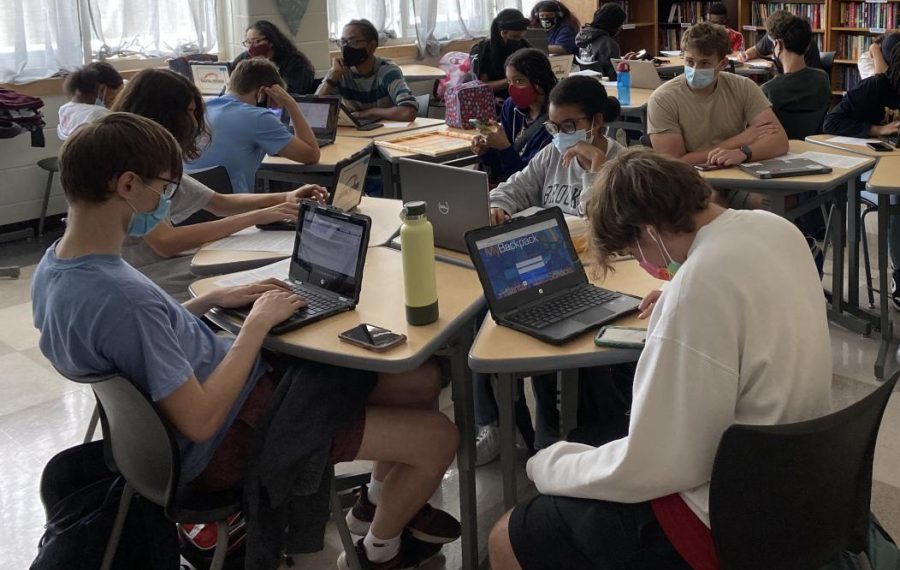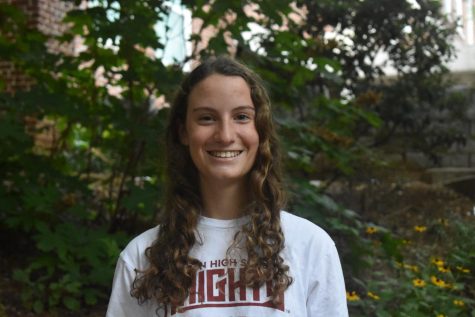Switch to Multicultural Lit hopes to provide a relatable curriculum
A Multicultural Literature class gets to work on a B-day. Multicultural Literature is a new class to Midtown this year, replacing British Literature.
October 22, 2021
Multicultural Literature, Multi-lens Literature and Composition, is a new English class offered at Midtown high school that looks to introduce a more relatable, diverse and exciting curriculum.
Before Multicultural Literature was a class, British Literature was one of the offered classes for seniors. English teachers Susan Barber, Emily Dohogne and Lexy Smolko pushed for the change.
“Ms. Smolko was kind of the brainchild behind the switch from British Literature to Multicultural Literature,” Dohogne said. “A lot of people love British Literature but it’s a little antiquated for modern times. We were trying to think of something that would be more relatable to students. It turns out that there are only two classes that qualify to replace a core class: Advanced Composition and Multicultural Literature.”
The initial idea for the class was to focus on Women in Literature and African Americans in Literature. However, after discussion between administrators and teachers, the curriculum expanded to a wider range of units.
“When talking to Tameka Thomas, the Secondary Literacy Coordinator, she wanted to make sure that it truly encompassed more than just one, or two groups of people. She wanted to make sure that [the class] fit the description that was advertised,” Dohogne said. “We worked with her to form eight mini units.”
The course units are centered around different cultures, and their impact on literature. This includes Women in America, Black in America, Latinx in America and Disabled in America.
“We are working with shortened works,” Smolko said. “We are focusing on different types of subcultures, races and groups. It is a modern version of American Lit. Instead of focusing on really long novels, we are focusing on diverse texts that are more centered around quality rather than quantity.”
The course recently finished its first unit, which focused on Women in Literature. Many students, including senior Toriah Dorsey, enjoyed it.
“I have learned a lot about the themes that involve people of color and minorities who are not represented as-much-as they should be in literature and in the media,” Dorsey said.
Senior Christopher Walker believes the course is more relevant and relatable to high school students, in comparison to British Literature.
“I feel like nobody really cared about British Literature as a general course, and that it was outdated,” Walker said. “Multicultural Lit is a course that is more relevant to society nowadays. It is a better class for seniors who are going into the world after highschool and it makes you a better person after taking the class.”
Dohogne has taken notice of students’ engagement in literature that she says are more tailored to their interests and own lives.
“It has been really good to have the class,” Dohogne said. “Administration-wise, everyone has been really excited about the difference, and being able to do something that is more modern. You get a lot more understanding and participation from the students when it is something that they actually care about, which is awesome.”
Senior Adeline Diem is also happy about the switch even though she would have enjoyed British Literature as well.
“I think it is good that they decided to make the switch.” Diem said. “ I would have loved reading Frankenstein, but it is good that they are including more perspectives. Learning about different experiences and different people, especially in America, could be eye opening for a lot of people.”
The class looks like it will have a lasting impact on students, and aims to achieve a new level of literary understanding.
“Our goal for this is basically to learn about a variety of different experiences for students to promote empathy and understanding,” Dohogne said. “And also be able to critically think about those experiences and how they are different from their own and what kind of impact they have.”
Smolko is excited for the remainder of the class and the units that are left to come. She sees many benefits to taking the course.
“I absolutely love this course,” Smolko said. “It is a lot of fun to give space and energy to have students tell me how their educational experience has been. I don’t think that British literature was very relevant in my students’ lives, so now they are able to connect pieces to their own personal experiences. I hope they are getting more out of this class than the archaic British Literature.”







